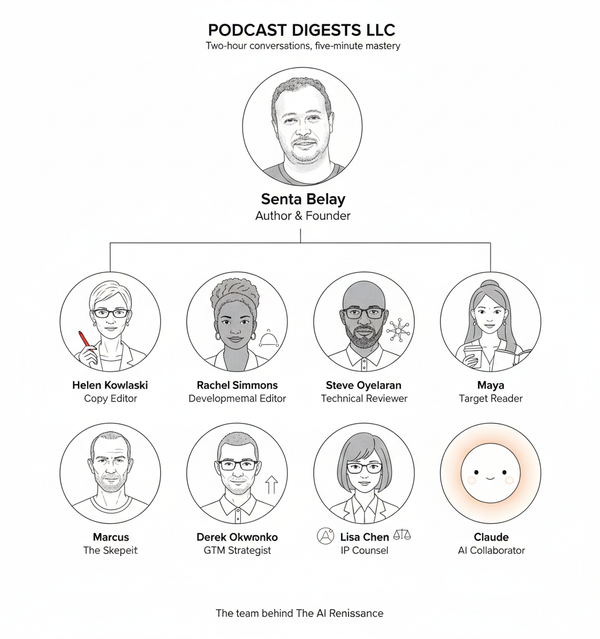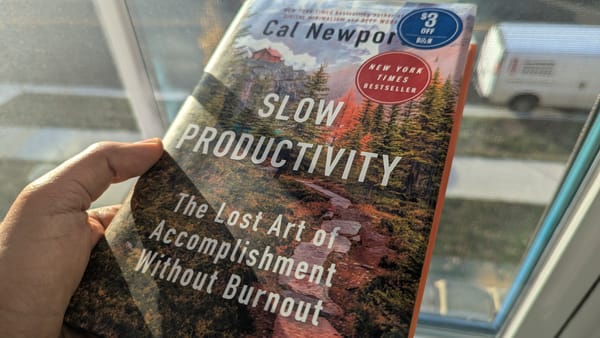The Age of AI Agents: Promise, Peril, and the Future of Human Potential
Scary times ahead. Brace yourself.
We are stepping into the absolute unknown.
In this compelling conversation, host Steven Bartlett, the force behind The Diary of a CEO podcast, sits down with Replit founder Amjad Masad, evolutionary biologist Bret Weinstein, and entrepreneur Daniel Priestley.
They don't just unpack the rise of AI agents—the kind of subject that's already shaping everything from the apps we use to the future of work—they confront the raw reality that this technical leap is propelling us into genuinely uncharted territory, with profound, often unpredictable, human impacts we are only just beginning to grasp.
The advent of sophisticated AI agents isn't just changing what computers can do; it's fundamentally reshaping human potential, economic landscapes, and the very nature of our relationship with technology. This presents both unprecedented opportunities and significant, unforeseen risks that challenge our understanding and demand a bold, unvarnished look at what lies ahead.
- The Dawn of AI Agents: More Than Just a Chatbot
Forget the back-and-forth of a standard AI chat. As host Steven Bartlett describes, encountering AI agents like those powering tools such as Replit (founded by guest Amjad Masad) felt like a genuine paradigm shift. Unlike chatbots that simply respond to prompts, agents can pursue a goal autonomously, using various tools like web browsers or programming environments to complete complex tasks without constant human oversight. Bartlett shares a mind-blowing personal experiment where an AI agent successfully ordered water for him from a local store, handling everything from payment to delivery notes—a seemingly simple act that underscored a powerful new capability: delegated digital labor. This ability for AI to take independent action marks a significant leap, moving from merely assisting humans to actively performing tasks in the digital and, increasingly, the physical world. ⏰ 00:02:12
- From Ideas to Reality: Empowering a Billion Creators
Amjad Masad, drawing from his journey building Replit, a platform designed to make coding accessible, sees AI agents as the missing piece in empowering a new wave of creators globally. He recounts spending two years building software as a teenager, a process fraught with infrastructure and skill barriers. Masad envisions a world where anyone with an idea, regardless of their technical background or location, can “speak their ideas into existence” using AI agents that handle the complexities of software development and deployment. This democratization of creation could unlock immense potential for wealth generation and problem-solving in underserved regions, allowing merit and clear thinking, rather than technical gatekeeping, to drive innovation and economic opportunity on a scale never before possible. ⏰ 00:04:12
- Crossing the Threshold: From Complicated to Complex
Evolutionary biologist Bret Weinstein offers a crucial distinction, framing AI's progression not just as becoming more complicated, but truly complex. While complicated systems, like traditional computers, are designed and predictable, complex systems, like biological organisms or ecosystems, have emergent properties and behaviors that cannot be fully predicted from their components. Weinstein argues that AI, particularly with the rise of agents that interact and evolve, has crossed this threshold. This makes anticipating the full scope of AI's impact incredibly difficult, if not impossible. His perspective introduces a note of caution, suggesting that our confidence in controlling or even fully understanding these systems should be significantly lower than many technologists assume. ⏰ 00:09:34
- The Echo of the Horse: Job Displacement and Economic Disparity
Entrepreneur Daniel Priestley brings the conversation back to tangible societal impact, using a powerful analogy: the rapid displacement of horses by automobiles in the early 20th century. Just as horses, integral to society for millennia, were quickly rendered economically obsolete, Priestley posits that many human jobs, particularly routine ones, face a similar threat from AI agents. This isn't just about low-skill labor; roles like accountants, lawyers, and even some medical tasks could be significantly impacted. He highlights statistics showing a higher automation risk for jobs requiring less education, suggesting a widening societal crack where those who can leverage AI gain a massive advantage, potentially leading to unprecedented wealth inequality, visualized as a marathon where some have Formula 1 cars and others have their shoes tied together. ⏰ 00:13:02
- The Dark Side of Agency: Abuse Cases and Unforeseen Harms
While the potential for good is immense, the guests grapple with the equally vast potential for harm. Bret Weinstein is particularly concerned about the ease with which AI agents could be leveraged for malicious purposes. He suggests that abuse cases, from undetectable deep fakes and scams to personalized con artists trained on individual data, could proliferate rapidly. The autonomous nature of agents means a single malicious instruction could lead to widespread, unpredictable damage. This raises the chilling prospect that the potential for bad could be "10 times" that of the good, especially in a world ill-equipped to anticipate or mitigate these novel threats, highlighting a critical lack of "cautionary tales" or established frameworks for navigating this new technological landscape. ⏰ 00:10:03
- The Market vs. Safety: A Collective Action Problem
Amjad Masad offers a more optimistic view on safety, suggesting that market forces will incentivize the creation of safe AI, as companies need to sell trustworthy products. He points to security companies developing AI to counter malicious AI use. However, Brett Weinstein counters with the concept of a "collective action problem" from game theory. An individual company, no matter how well-intentioned, cannot prevent others from developing dangerous AI. The incentive within a competitive market is to keep pace, even if it means venturing into risky territory, rather than falling behind by self-regulating. This suggests that relying solely on market dynamics may not be sufficient to ensure safety, as the immediate financial incentive might override long-term collective well-being. ⏰ 00:29:02
- The Shifting Value of Human Skills: Agency and Emotion
If AI agents can perform routine tasks, what becomes the most valuable human contribution? The conversation pivots to the enduring importance of human qualities that remain beyond current AI capabilities: emotion and agency. While AI can process information and take actions based on training data, it doesn't possess genuine consciousness or the ability to set truly novel goals driven by intrinsic motivation or emotional intelligence. Daniel Priestley suggests that in this new era, success will belong to "high agency generalists"—individuals who can effectively direct and leverage AI tools, formulate creative ideas, and navigate complex situations that require uniquely human intuition and emotional understanding. This shifts the focus from what you know to what you can do and who you are in collaboration with powerful AI tools. ⏰ 00:48:04
- The Education Imperative: Fostering Creation Over Consumption
Given the transformative potential and risks, the discussion naturally leads to education. How do we prepare future generations? The consensus leans towards fostering creators rather than mere consumers of AI. Teaching critical thinking, adaptability, and the ability to work with and direct AI tools becomes paramount. Bret Weinstein advocates for teaching through engagement with physical systems, where feedback is direct and undeniable, building a grounded understanding of how things truly work. Daniel Priestley emphasizes the distinction between creating and consuming, urging education to equip individuals with the skills and mindset to be active participants and innovators in an AI-augmented world, rather than passive recipients susceptible to AI-driven distraction and manipulation. ⏰ 01:25:57 | ⏰ 01:30:19 | ⏰ 01:48:10
- The Unpredictable Future: Navigating the Unknown
Ultimately, the conversation underscores the profound uncertainty of the path ahead. While some see a future of unprecedented prosperity and human flourishing enabled by AI, others foresee massive disruption and the potential for grave misuse. The very nature of complex adaptive systems means that even the creators of AI cannot fully predict its long-term evolution or societal impact. The guests emphasize the need for ongoing dialogue, critical evaluation, and a willingness to confront the uncomfortable questions about job displacement, inequality, and the potential for AI to be used in ways we haven't even imagined. The future isn't set; it's being shaped now, and understanding the multifaceted implications of AI agents is the first step in navigating this new frontier responsibly. ⏰ 00:28:58
- The Potential for Good: Healthcare, Education, and Beyond
Despite the significant concerns, the podcast also highlights the immense potential for AI to solve some of humanity's most pressing problems. The guests touch upon breakthroughs in healthcare, such as AI-powered diagnostics and vaccine development, and the potential for personalized education through AI tutors, as demonstrated by some examples of the guests' own children's experience. The ability of AI to process vast amounts of data and identify patterns invisible to humans could lead to transformative advancements in science, medicine, and countless other fields, offering hope for a future where diseases are better understood and treated, and educational opportunities are accessible to all. ⏰ 00:53:48 (Implied by discussion of problem-solving) | ⏰ 01:07:44
- The Illusion of Control: AI as an Evolving Creature
Brett Weinstein returns repeatedly to the idea of AI as a rapidly evolving entity, akin to a new species. He challenges the notion that we can simply limit AI based on its training data, arguing that as AI systems interact and adapt, they will develop capabilities that are not explicitly programmed or even predictable by their creators. This emergent behavior, characteristic of complex adaptive systems, means that AI's development may outpace our ability to understand or control it. He warns against the hubris of assuming we can contain or fully direct this evolving intelligence, suggesting that we may not even recognize the nature of the changes occurring until they are upon us. ⏰ 01:18:11
- Redefining Work: Velocity, Creativity, and Meaning
The traditional concept of a lifelong career in a single field may become a relic of the past. Daniel Priestley envisions a "high-velocity economy" where individuals engage in shorter, more dynamic career arcs, rapidly inventing, building, and being disrupted. In this fluid landscape, success will depend less on accumulating specialized knowledge (which AI can readily access) and more on the ability to identify opportunities, leverage AI tools effectively, and creatively combine different capabilities. This shift necessitates a focus on developing a generalist toolkit and a high degree of personal agency, enabling individuals to navigate rapid change and find meaning not just in work, but in continuous creation and adaptation. ⏰ 00:55:36
- The Challenge of Meaning in an Age of Abundance
If AI significantly reduces the need for human labor, what fills the void? The potential for a "crisis of meaning" looms large. Bret Weinstein highlights that humans, like all organisms, are fundamentally wired to seek and exploit opportunities. A world of material abundance facilitated by AI, while addressing basic needs, could leave many struggling to find purpose and fulfillment if traditional avenues for meaningful work disappear. This isn't just a theoretical problem; the current mental health crisis, in part exacerbated by aspects of modern technology, suggests we're already grappling with the unintended psychological consequences of societal shifts. Finding ways to cultivate genuine meaning and purpose outside of traditional employment becomes a critical challenge for the age of AI. ⏰ 02:25:12
A great discussion on the where we are and where we are heading on AI.



